Freezing temperatures, uncertainty and concern among migrants living outside Chicago police stations: ‘How are we going to survive winter here?’
Chicago Tribune (
archive.ph)
By Laura Rodriguez Presa and Nell Salzman
2023-10-31 17:32:57GMT
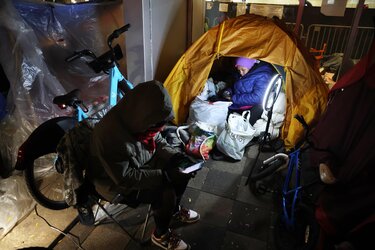 Yessica Karolina Badell Palmar, right, a migrant from Venezuela, in her tent outside the Chicago police 1st District station on South State Street as cold weather takes hold on Oct. 30, 2023. (Terrence Antonio James/Chicago Tribune)
Yessica Karolina Badell Palmar, right, a migrant from Venezuela, in her tent outside the Chicago police 1st District station on South State Street as cold weather takes hold on Oct. 30, 2023. (Terrence Antonio James/Chicago Tribune)
Thousands of migrants sleeping at police stations woke up to freezing cold conditions on Halloween morning as city officials, volunteers and faith-based organizations scrambled to find warmth Tuesday for a population, mostly from Venezuela, that has never experienced cold.
Temperatures plummeted overnight to a low of 30 degrees at O’Hare International Airport, said the National Weather Service, and safety networks stepped in to react to emergencies brought on by the cold. Temperatures were expected to stay around 37 degrees with light snow flurries for 24 hours, weather officials said.
 Migrants queue up outside the Chicago police 1st District station on Oct. 30, 2023, to get donated clothing better suited for colder temperatures. (Terrence Antonio James/Chicago Tribune)
Migrants queue up outside the Chicago police 1st District station on Oct. 30, 2023, to get donated clothing better suited for colder temperatures. (Terrence Antonio James/Chicago Tribune)
Migrants across the city huddled under thin blankets as they sat on cardboard boxes or in tents, lined up for the chance to shower and warm up inside churches and rushed to claim warm jackets and clothes brought by volunteers. A handful of the 16 warming buses sent to police stations from 8 p.m. to 8 a.m. that were witnessed by the Tribune were scarcely used, perhaps because of the trauma migrants experienced being bused to Chicago from the border, volunteers surmised.
At least one mother decided she’d had enough and decided to go back to Texas.
“I thought we would find help here, but there’s nothing here for us,” said Andrelys Leon, 28, who had been living at the 12th District station with her 7-year-old son. She came to Chicago two weeks ago, and said life has been difficult. She realized that even if she got transferred to a shelter, it would be difficult to find a job or a permanent place to live.
On Tuesday, she gathered her belongings, grabbed her son’s hand and walked the 1.3 miles to a Greyhound station to catch a bus back to Texas.
The city still has no clear timeline for when new brick-and-mortar shelters will open for the more than 3,000 migrants who are awaiting shelter, with more arriving from border cities every day. With each new shelter consideration, Mayor Brandon Johnson’s office receives major pushback from aldermen and residents, as well as resistance to his controversial plan to erect heated base camps to protect migrants from the fast-approaching winter.
On Monday night, as the temperature began to fall at the 1st District police station on the Near South Side, children with pink noses and eyes teary from the wind shivered as they ran around without shoes; some without sweaters. Parents prepared tents by tying layers of black plastic bags or a tarp over them.
When a religious group of volunteers showed up with a truckload of children’s clothes, mothers rushed to get in line with their children.
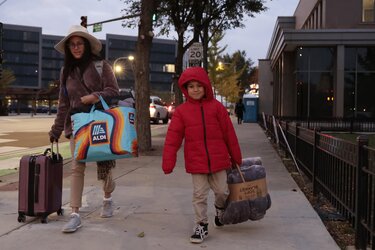 Venezuelan migrants Andrelys Leon, 28, and her son, Thiago Marin, 7, carry their belongings along Blue Island Avenue after leaving a police station, Oct. 31, 2023. They were leaving the shelter and heading to a Greyhound station to catch a bus back to Texas. (Antonio Perez/Chicago Tribune)
Venezuelan migrants Andrelys Leon, 28, and her son, Thiago Marin, 7, carry their belongings along Blue Island Avenue after leaving a police station, Oct. 31, 2023. They were leaving the shelter and heading to a Greyhound station to catch a bus back to Texas. (Antonio Perez/Chicago Tribune)
“My duelen los pies del frio,” Maikol Barbosa, 8, told his mom while looking up at her and rubbing his hands together as they waited in line. “My feet hurt because of the cold.”
His mother looked down and wrapped her arms around him. “How are we going to survive winter here?” his mother, Yessika Karolina Badell, 35 asked another mother in line.
 https://twitter.com/LAURA_N_ROD/status/1719155327851958781
https://twitter.com/LAURA_N_ROD/status/1719155327851958781 (
archive.ph)
Johnson released a statement Tuesday addressing how the city is responding to the crisis.
“With colder weather upon us, we are at an increasingly critical point in this humanitarian endeavor. To protect new arrivals and unhoused Chicagoans from falling temperatures, the city is collaborating with external partners, volunteers and mutual aid groups to provide blankets, coats, and other much-needed items,” he said. “Sixteen warming buses are being provided by the CTA at the landing location, and 16 police district locations from 8 p.m. to 8 a.m., while the city works to expand the number of available buses.”
Late Tuesday Mary May, spokesperson for OEMC, said that the city was adding five additional buses to cover all 21 districts staging migrants.
Annie Gomberg, who leads volunteer efforts at the police station in Austin, said 16 buses were not enough. She said she didn’t know about any effort by the city to provide blankets, jackets or outerwear. And many migrants who she interacts with tell her they are hesitant to get on another bus, after riding a bus for hours to get to Chicago.
“We try to help them understand that they’re not going to fall asleep on this bus, and it’s going to drive away to another state,” she said.
Several religious groups arrived at the Near South Side station at the same time as the warming bus Monday night, including leaders from Jesus Chicago and Christian Hills Church, who drove about an hour to Chicago to hand out blankets, shoes and clothes, they said.
“However you feel about anything, these are souls and they’re humans,” said Pete Les, from Jesus Chicago.
At a makeshift encampment with over 50 tents in a park across the street from the police station in Austin, Nelys Cedeño, 48, said she had to rush her 2-year-old granddaughter Dayneli to the hospital four days ago because the young girl was showing symptoms of pneumonia. They covered her with layers of blankets, but she said it wasn’t enough.
“The cold passes through everything,” she said in Spanish. “They are so little. It affects them more.”
On Monday night, Cedeño walked along West Madison Street with her friend Enrique Brito, 39, to a community meeting held in the Oak Park Village Hall to discuss what to do about the cold.
The whole meeting was in English, and no one knew what happened. They left discouraged and walked back to the station.
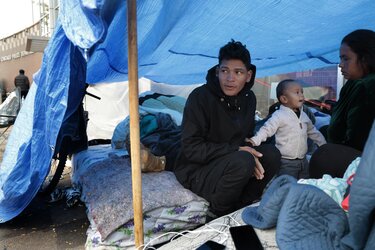 Venezuelan migrants Leonardo Covieles, wife Marielis Rivas and their son, Lerondro, 1, take shelter in a tent pitched outside the 1st District police station on State Street on Oct. 31, 2023. (Antonio Perez/Chicago Tribune)
Venezuelan migrants Leonardo Covieles, wife Marielis Rivas and their son, Lerondro, 1, take shelter in a tent pitched outside the 1st District police station on State Street on Oct. 31, 2023. (Antonio Perez/Chicago Tribune)
Meanwhile, despite the cold, Marielis Rivas, 33, said she planned to sleep with her 1-year-old on a mattress covered by a tarp outside the station like she has done it for the past 15 days at the Near South Side police station.
But by 1 a.m., her baby couldn’t handle it anymore and she went inside the station to find a spot where they could rest. By 7 a.m. Tuesday, she was back outside, without a jacket and the baby wearing only a sweater.
“There’s just no more space inside, and people did come to drop off jackets yesterday, but people rushed to them, we couldn’t get anything,” Rivas said.
Volunteers and health advocates say they worry about the possible health care crisis that the cold can cause. Erika Villegas, a lead volunteer at the 8th District in Chicago Lawn said that city officials are “not taking this seriously enough.”
The conditions in which migrants had been living outside the police stations, creating tent cities, “were inhumane, but now this is truly a crisis. There are hundreds of children out there.”
Dr. Scott Dresden, an associate professor of emergency medicine at Northwestern University Feinberg School of Medicine and a Northwestern Medicine physician, said he wasn’t sure how the thousands of migrants that have arrived since last August would influence the numbers of people he treats in emergency departments over the next few months.
“This is certainly a unique winter with a larger population who are without housing than we are used to,” he said.
When someone has mild hypothermia they will start shivering, Dresden said. As the body shuts down, confusion will set in. The shivering will stop. He said severe hypothermia can cause cardiac arrest.
Michael Kurz, professor and chief of the section of emergency medicine at University of Chicago said anybody who experiences hypothermia needs to be cared for by a physician. If someone is symptomatic, he said, they should call 911 immediately. The most important preventive measure is to seek shelter or find a source of warmth.
“We will literally exhaust any resource in order to be able to accommodate citizens of our community and make sure they have what they need,” he said. “But it appears (that) the influx of migrants is rapidly outscaling the resources the city has to provide.”
At the 12th District station in Little Italy Monday night, several people slept on the ground or on cardboard boxes. Only a few had blankets or jackets. There was no warming bus there.
Two brothers who arrived in Chicago just four days ago got a jacket from some people while searching for a job, they said. They hadn’t worried too much about where they were going to spend the night until the temperatures dropped.
They got four cardboard boxes and another asylum-seeker lent them a blanket.
“We have no other option than to sleep here,” said Juan Jose Hernandez, 33.
And they did, by 6 a.m. on Tuesday, the two still lay next to each other, on the ground covered from head to toe. Like many of the asylum-seekers, they did not know the brutality of Chicago’s winter.
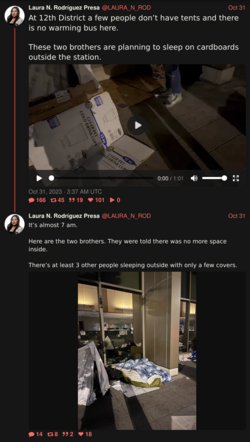 https://twitter.com/LAURA_N_ROD/status/1719196771946008800
https://twitter.com/LAURA_N_ROD/status/1719196771946008800 (
archive.ph)
Outside of St. Catherine of Siena-St. Lucy and St. Giles Parish near a police station in Austin, more than a dozen migrants waited Tuesday morning for warm showers. Dhian Gomez, 29, from Venezuela, held his hands together and shivered uncontrollably.
“My hands, my hands,” he cried out in Spanish.
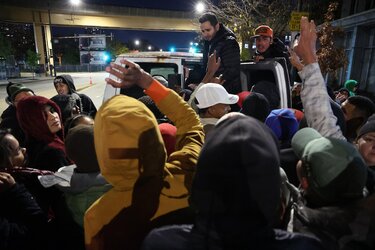 Peter Les, center background, helps distribute donated clothing better suited for colder weather to migrants outside the 1st District police station on Oct. 30, 2023. (Terrence Antonio James/Chicago Tribune)
Peter Les, center background, helps distribute donated clothing better suited for colder weather to migrants outside the 1st District police station on Oct. 30, 2023. (Terrence Antonio James/Chicago Tribune)
Women and children slept inside the Austin police station Monday night, with single men braving low temperatures in tarp-covered tents outside.
Jose Guevara, 29, from Venezuela, said his 4-year-old son Jerial was stung in the eye by a wasp that got into their tent two days ago. They went to the hospital in an ambulance but were turned away, he said. Volunteers at the station bought Jerial medicine instead.
“They’ve brought us so much food. They bring blankets. Towels. But what we want most is to get out of here,” he said in Spanish, looking at Jerial curled up on the floor inside the station, his eye still swollen shut.
Migrants at the police station in Austin said their legs were puffy from the cold. On Tuesday morning, the lined up to brush their teeth in the two bathrooms available to the public — with a metallic smell, overflowing trash cans, dirty floors and tiny stream of water flowing from the sink.
Migrants go to a nearby church on Tuesday and Thursday to shower, they said.
Though most struggled to get warm on their first Halloween in Chicago, at least one reveled in the wonder of it all.
After spending the night sleeping in a tent outside a police station in Austin, 23-year-old Paula Oliver from Venezuela stood outside the church and looked up as the sky turned itself inside out and flakes dropped onto her face — her first snow.
“It’s so beautiful,” she said in Spanish. “Look how it falls over everything.”
---
Chicago and other US cities struggle to house asylum-seekers as winter weather hits
Associated Press (
archive.ph)
By Sophia Tareen
2023-11-01 22:29:34GMT
CHICAGO (AP) — As the first blast of wintry weather hit Chicago, dozens of migrant families without a place to live were moved off snowy city streets and into the basement of Good Shepherd Lutheran Church in a nearby suburb.
The last-minute, temporary solution around 1 a.m. Wednesday, coordinated by volunteers and suburban officials, came as Chicago and other cities have struggled to house the growing population of asylum-seekers ahead of the deep winter months. Mayor Brandon Johnson has proposed
winterized tents, like in New York, and more shelters to house migrants who are sleeping in
police stations,
airports and the streets. But volunteers, churches and some aldermen say the response is too slow and inefficient.
“Good will and charity cannot fix systemic problems,” said Annie Gomberg, who is part of a volunteer network that coordinates meals and clothing at police stations. “This is a lack of infrastructure and a lack of planning.”
Similar issues could occur as wintry weather closes in on New York, which is struggling to accommodate a growing migrant population, and Denver, which was prompted to loosen its rules on how long migrants are kept in shelter during a recent cold snap.
More than 20,000 migrants have arrived in Chicago since last year, largely under
the direction of Republican Texas Gov. Greg Abbott.
More than 3,000 are living inside airports and police stations while they await shelter placements, including in park district field houses, although some have moved into tents in adjacent streets and vacant lots due to
overcrowding. The end goal, officials say, is permanent independent housing.
Volunteer organizations, who have provided the bulk of meals and clothing, say they’re now giving winter survival tips, too. Layering clothing is a novel concept for most of the migrants who are used to warmer climates. Temperatures dipped to the low 30s (around 0 Celsius) by Wednesday.
Many are from Venezuela, where a
political, social and economic crisis has pushed millions of people into poverty. At least 7.3 million have left the country, with many risking a dangerous route by foot to the United States.
The donated tents are lined with cardboard, blankets and draped with tarps to ward against the cold.
Gleicy Martinez, 27, from Venezuela, has lived for three weeks in a tent outside a Chicago police station with her two children, including a 9-year-old who is blind.
They rarely leave the tent because of the cold. When the storm hit Tuesday, they went inside the police station but it was too full. They walked to a nearby Target store for warmth.
“The snow caught us unexpectedly,” Martinez said Wednesday. “We didn’t know it was going to snow.”
City officials call the migrants’ arrival an inherited issue that they’re trying to address.
Johnson’s administration has opened over a dozen more shelters since he
took office in May. City officials have scouted locations for winterized tents, but details are sparse. Johnson estimates Chicago will spend roughly $255 million on the migrant crisis in 2023.
Johnson told reporters Wednesday that his goal was still to get migrants into shelters by winter.
“I’m working every single day to create spaces to move people out of police stations and do it in a way that is dignified,” he said. “It’s cold but winter is not here yet.”
This week, the city publicized its cold weather efforts, including providing 16 “warming buses” at police stations during overnight hours. Last month, the city touted its partnerships with outside organizations.
On Wednesday, Johnson and the mayors of four other cities
wrote to President Joe Biden, seeking a meeting to secure more federal resources.
Those cities included New York, where thousands of migrants are sleeping in climate-controlled tents erected on empty parking lots and athletic fields, as well as a former airport runway. The facilities are kept warm by industrial heaters.
New York hasn’t experienced the same issues as Chicago, yet, but that could soon change: Local officials want to suspend a
unique legal agreement guaranteeing overnight shelter to those without housing.
As New York struggles to accommodate its growing migrant population, Mayor Eric Adams has suggested that new arrivals may soon be forced to sleep in the streets, a “terrible situation” he’s painted as inevitable.
In Denver, some migrants are living in tents, including over the weekend when the lows reached 12 degrees (minus 11 Celsius). Denver suspended its limits on how many days migrants can stay at a shelter because of the weather, but restored them as temperatures reached above 20 degrees Tuesday and kicked roughly 200 people out.
Elis Aponte, 47, from Venezuela, was staying in a tent in Denver. She said she feared she would freeze to death going to a bathroom at a gas station across the street. She wore a red puffy jacket and ski gloves,
“It was freezing, freezing cold,” she said, noting her five blankets.
In Oak Park, just 10 miles (16 kilometers) from Chicago, the Rev. Kathy Nolte received a call from officials around 1 a.m. asking if she could open up her church. Within minutes, a bus of migrants had arrived at the doors of Good Shephard, mostly families with young children.
Later, she performed a blessing for them and their journey. She hopes the church shelter is short-lived.
“We got them into a place where they could have warmth and a sense of their space,” she said.











